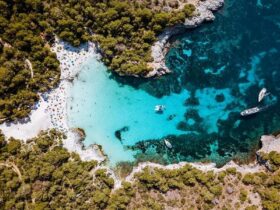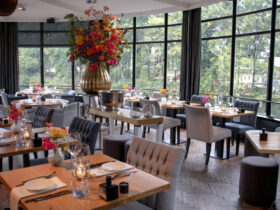The nomadic culture of Western Mongolia is rich, diverse, and deeply rooted in tradition. Here’s what you need to know about the nomadic culture of the region:
- Traditional Nomadic Lifestyle: Western Mongolia is home to a vibrant nomadic culture that has remained largely unchanged for centuries. Nomadic herders move with their livestock across the vast steppes, mountains, and deserts of the region, following seasonal patterns of grazing and migration.
- Ger Camps: Gers, or traditional felt tents, are the primary form of housing for nomadic families in Western Mongolia. Many tour operators offer the opportunity to stay in ger camps, providing travelers with a unique opportunity to experience authentic nomadic hospitality and learn about traditional Mongolian culture and customs.
- Livestock Herding: Nomadic families in Western Mongolia rely primarily on livestock herding for their livelihoods, raising animals such as sheep, goats, yaks, horses, and camels. Livestock provides essential resources such as meat, milk, wool, and transportation, and plays a central role in nomadic culture and traditions.
- Traditional Clothing: Nomadic herders in Western Mongolia wear traditional clothing made from wool and leather, including deels (long robes), hats, and boots. These traditional garments are designed to provide protection from the harsh climate and rugged terrain of the region, while also reflecting the cultural heritage and identity of the wearer.
- Hospitality and Generosity: Nomadic culture in Western Mongolia is characterized by a strong sense of hospitality and generosity. Nomadic families welcome travelers with open arms, offering food, shelter, and friendship to all who pass through their lands.
- Cultural Experiences: Many tour operators offer cultural experiences that allow travelers to immerse themselves in the nomadic way of life. These experiences may include visits to nomadic families, opportunities to participate in daily activities such as milking yaks or making dairy products, and traditional music and dance performances.
- Throat Singing: Throat singing, or khoomei, is a traditional form of singing that is practiced by nomadic herders in Western Mongolia. Throat singers produce multiple pitches simultaneously by manipulating their vocal cords, creating haunting and ethereal melodies that reflect the natural beauty and spiritual connection of the Mongolian landscape.
- Festivals and Celebrations: Western Mongolia is home to a variety of festivals and celebrations that showcase the rich cultural heritage of the region. These festivals may include traditional sports such as horse racing and archery, as well as music, dance, and other cultural performances.
Overall, the nomadic culture of Western Mongolia offers travelers a unique opportunity to experience the traditional way of life of the Mongolian people, learn about their customs and traditions, and forge meaningful connections with the local community. Whether you’re staying in a ger camp, visiting a nomadic family, or attending a traditional festival, you’re sure to come away from the experience with a deeper understanding and appreciation of Mongolian culture and heritage.
What Are the Cultural Experiences When Touring Western Mongolia?
When touring Western Mongolia, you’ll have the opportunity to immerse yourself in the rich cultural heritage of the region. Here’s what you need to know about the cultural experiences available:
- Nomadic Lifestyle: Western Mongolia is home to a vibrant nomadic culture that has remained largely unchanged for centuries. During your tour, you’ll have the opportunity to experience the traditional nomadic way of life firsthand, with visits to nomadic families, stays in ger camps, and participation in traditional activities and ceremonies.
- Ger Camps: Many tour operators offer the opportunity to stay in ger camps, providing travelers with a unique opportunity to experience authentic nomadic hospitality. Ger camps are traditional felt tents used by nomadic families as portable homes, and staying in one offers a unique opportunity to learn about traditional Mongolian culture and customs.
- Nomadic Cuisine: Western Mongolia is home to a rich culinary tradition, with a focus on hearty and nourishing dishes made from locally sourced ingredients. During your tour, you’ll have the opportunity to sample traditional Mongolian dishes such as buuz (steamed dumplings), khuushuur (fried dumplings), airag (fermented mare’s milk), and dairy products such as yogurt, cheese, and dried curds.
- Traditional Music and Dance: Western Mongolia is also home to a rich tradition of music and dance, with vibrant performances that showcase the cultural heritage of the region. Many tour operators offer the opportunity to attend traditional music and dance performances, including throat singing demonstrations, horse head fiddle performances, and lively dance routines.
- Festivals and Celebrations: Western Mongolia is home to a variety of festivals and celebrations that showcase the rich cultural heritage of the region. These festivals may include traditional sports such as horse racing and archery, as well as music, dance, and other cultural performances. Attending a traditional festival is a unique and unforgettable way to experience the cultural traditions of Western Mongolia.
- Arts and Crafts: Western Mongolia is known for its rich tradition of arts and crafts, including traditional textiles, feltwork, leatherwork, and more. Many tour operators offer the opportunity to visit local artisans and learn about traditional crafting techniques, providing travelers with a unique opportunity to purchase handmade souvenirs and support local artisans.
- Language and Communication: While English may not be widely spoken in rural Mongolia, experienced guides can help bridge the language barrier and facilitate communication between travelers and local communities. Learning a few basic phrases in Mongolian can also enhance your cultural immersion experience and help you connect with the local people.
- Respect for Tradition: Cultural experiences in Western Mongolia require respect for the traditions and customs of the Mongolian people. Travelers should be respectful of local customs, follow the guidance of their guides, and ask permission before taking photographs or entering private spaces.
Overall, cultural experiences add depth and meaning to touring Western Mongolia, providing travelers with a unique opportunity to connect with the rich traditions, heritage, and way of life of the Mongolian people. Whether you’re visiting nomadic families, staying in ger camps, or attending a traditional festival, you’re sure to come away from the experience with a deeper understanding and appreciation of Mongolian culture and customs.








Leave a Reply